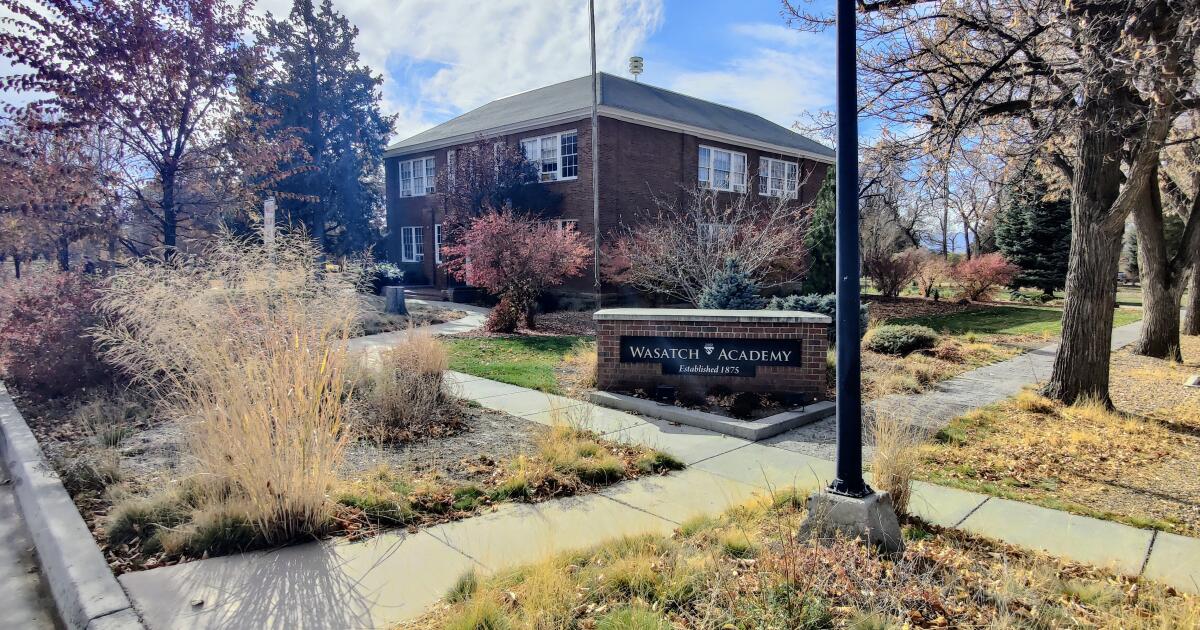[ad_1]
With population of 3,754 and elevation 5,924 feet, Mount Pleasant is a map dot off Highway 89 in central Utah, two hours south of Salt Lake City in the Sanpete Valley surrounded by snow-capped mountains.
There’s a two-block main street with a city hall and some vintage store fronts — you turn right off 89 at Rodger’s Dairy Freeze, known for its famed Bishop Shake — but that quickly gives way to alfalfa fields, bailed hay, weathered barns and grazing cows. The overwhelming majority of residents are white and Mormon, as neighboring towns named after Latter Day Saints religious figures (Moroni, Ephraim, Manti) can attest.
This is home to one of the nation’s top high school basketball powers and arguably its most unique, a roster of mostly Black kids from the inner city.
“You got to want to hoop if you are going to make it here,” Taj Degourville says.
Degourville is a 6-foot-5 San Diego State commit from Las Vegas who led Durango High School to a state title last season. His high school coach left, and a few other of the city’s top players were talking about coming to Wasatch Academy, the 148-year-old boarding school in Mount Pleasant that annually churns Division I prospects. In the past few years, it has sent players to Gonzaga, Ohio State, Purdue, Michigan State, Syracuse, Kansas State, Oklahoma State, Utah, BYU and Washington.
Degourville figured, why not? How hard could it be?
He arrived on a Sunday in late August. The first practice was the next afternoon. No problem.
Then the 5 a.m. practices started. Then the two-a-days. Then the weightlifting sessions, and the individual workouts, and the film review. The small classes where you can’t hide in the back or skip homework. The dorms. The cafeteria.
The weather.
The demographics.
“Honestly, I was so scared to do it, but I know it’s going to prepare me for college,” Degourville says. “I didn’t want to get to college and have to prepare during my freshman year. But it was so hard for me, so hard for me – being in the middle of nowhere, being away from my family, just so isolated, so different from home.
“I didn’t feel normal. I wasn’t ready for what we were doing. It was so new. My energy was down. I was slacking because I wasn’t used to it.”
Coach Paul Peterson called Degourville’s mother, Tisha.
Tisha called Taj.
“She said: ‘Didn’t we talk about this?’” Degourville says. “She said: ‘Am I going to have to come get you? Because this is not going to go. I didn’t let you go out there to be slacking. You need to pick it up.’
“She didn’t have to call anymore. Right after that call, I turned the corner.”

Taj Degourville transferred to Wasatch Academy from Durango High School in Las Vegas.
(Las Vegas Review-Journal)
Peterson shrugs.
It happens to all his players that first week. Most survive and adapt and thrive. Only a few have left.
“I tell them: ‘It’s the hardest thing you’ll ever do,’” Peterson says. “I’m honest with them, completely honest with them. … Books and ball. I shoot it straight. I don’t lie. You either want it or you don’t.”
He recently removed TVs and video games from players’ rooms.
“Some grades started to slip,” he explains.
And Peterson doesn’t want to hear any complaints about the 5 a.m. practices. He lives in the Salt Lake City suburb of Lehi and makes the 75-minute drive down Highway 89 every morning. Wakes up at 3 a.m.
“It’s boot camp,” says SDSU coach Brian Dutcher, who has visited Wasatch Academy and rates the drive down Highway 89 among the prettiest in the country. “I mean, every day is hours of practice and weight training. It’s a full basketball year, and they play high-level competition. Taj will be tested unlike a lot of high school players are.”
Wasatch Academy and its 35-acre campus wasn’t always basketball boot camp. It opened in 1875, one of Utah’s oldest schools. It started playing basketball in 1912 and for the next century toiled in the state’s small-school division with a high school enrollment hovering around 200.
Geno Morgan changed that, coaching the Tigers to three state 2A titles before taking them independent in 2014. Morgan died from a heart attack the following year, but his vision of basketball grandeur in remote, rural Utah was realized by his successors.
The school bought the old downtown gymnasium — think Hickory High School in “Hooisers” — and refurbished it for a basketball program quickly achieving national prominence. Peterson, who played at Division II BYU-Hawaii and then professionally in Europe, became head coach in 2020 and put Wasatch in the Nike-sponsored National Interscholastic Basketball Conference with many of the most revered prep basketball factories in the country: Oak Hill Academy in Virigina, Montverde Academy in Florida, La Lumiere School in Indiana, Sunrise Christian in Kansas.
Wasatch has a team drawn from the rest of its student body that competes against Utah high schools. The “national team” isn’t subject to state high school federation rules about recruiting or practice hours and plays a schedule with 28 games in nine states plus Canada, culminating in a national championship in April. This week, they’re in Georgia. Next week, Arizona.
Wasatch, the school, has remained largely unchanged, however. It boasts an average class size of 12 with a mix of domestic and foreign students from more than 30 countries. Eight-five percent of them live on campus. Tuition ranges from $37,300 for day students to $70,800 for international boarders. Everyone goes to college.
Dorms ring the central lawn. DeGourgville is on the first floor of Sage Hall, which was built in 1923. Faculty live in homes across the street. There’s a residence for visiting parents, even a vacant dorm where visiting NIBC teams stay since it’s not like Mount Pleasant — population 3,754, elevation 5,924 — has any hotels.
Degourville’s typical day: 5-7:30 a.m. breakfast practice, film session, individual shooting workout, Calculus, English, lunch, Art, Psychology, 3:15-6:30 p.m. practice, dinner, homework, lights out at 9.
“Never been to bed so early in my life,” Degourville says.
In an era of pop-up basketball “schools” in strip malls that pay lip service paid to academics, Wasatch Academy is a remote, rural alternative. Kids go to class. There also are five practice courts, weight room and film room.
“If you have a good basketball team, it puts eyes on the school,” says Peterson, who gets nine full scholarships for his 11-player roster. “But they don’t want to be a pure basketball school. They value sports and see it as part of the whole academic experience. … If you go visit one of these other schools first and then visit here, you’re coming here. If your parents care anything about your well-being, you’re coming here. They like the structure, the supervision, the academic help.”
Wasatch has an unwritten agreement with Utah’s high schools that it won’t steal any of their players, making the entire roster from out-of-state. Degourville is one of three seniors committed to high-major programs. Guard John “Juni” Mobley from Rochester, N.Y., is headed to Ohio State and Malick Diallo from the West African nation of Mali to TCU. There also are a pair of five-star juniors: 6-5 Isiah Harwell from Pocatello, Idaho, and 6-7 Chris Nwuli from Las Vegas.
Peterson, who is in constant contact with SDSU’s coaching staff, has been playing DeGourville at the point to make him more versatile at the next level, refining his defense, improving his jump shot, honing his leadership skills.
“Competing against these guys every day is really good,” Degourville says. “It’s basically like pre-college. It’s what you need. I’ve got so many reps up since I’ve been here. You can feel the difference. The work is going to show.”
Winter is coming. Last week, overnight temperatures hit zero. A couple days later, it was in the 30s with 30 mph winds. Snow is in the mountains.
Degourville is asked what there is to do in Mount Pleasant outside of Calculus, English, Art and Psychology.
“Basketball,” he replies. “Basketball, all day. Can’t complain about that. It’s cool.”
[ad_2]


Leave a Reply
You must be logged in to post a comment.